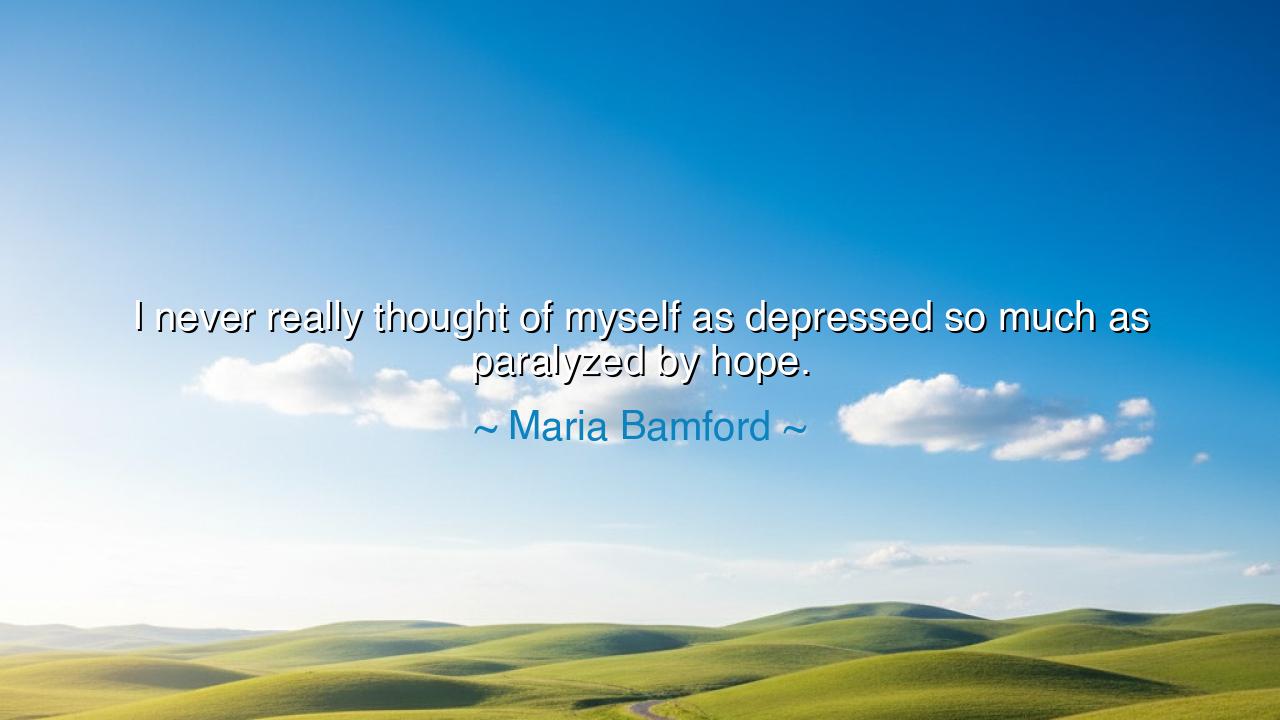
I never really thought of myself as depressed so much as






“I never really thought of myself as depressed so much as paralyzed by hope.” Thus spoke Maria Bamford, a comedian whose laughter is laced with truth and whose words shine with the courage of self-revelation. In this hauntingly tender declaration, she transforms despair into something more complex — a state not of emptiness, but of yearning so deep it becomes immobilizing. Her words are not a lament but a mirror, reflecting the quiet agony of those who carry hope like a burden too heavy to lift. For she teaches us that even hope, that sacred fire of the human spirit, can burn too brightly — blinding rather than guiding — when the soul is caught between longing and fear.
Maria Bamford, known for her openness about mental illness, spoke these words not as a philosopher, but as one who has walked through the valley of the mind and returned with light. Through her art, she reveals the paradox of human endurance: that the same hope which keeps us alive can also leave us frozen, unable to act, because we fear to lose it. Paralyzed by hope — what a profound image! It is the stillness of one who dreams of better days yet feels powerless to bring them forth. It is the ache of a soul that sees the possibility of joy just beyond reach, yet cannot cross the gulf of doubt and exhaustion to grasp it.
This paradox has echoed throughout the ages. The poet Tantalus, in Greek myth, stands forever beneath the fruit he longs to taste, with water at his feet he cannot drink. He is not without hope — indeed, it is hope that torments him. Each moment promises fulfillment, yet none delivers. So it is with those who suffer silently beneath the weight of expectation — who believe, somewhere within, that life can still be beautiful, yet find themselves unable to step toward that beauty. Bamford’s words give voice to this ancient struggle between desire and despair, between the dream of healing and the paralysis that comes when the dream feels unreachable.
There is a kind of bravery in what she confesses. For to speak of one’s pain with such clarity is itself an act of defiance against it. In calling herself “paralyzed by hope,” Bamford reclaims her humanity from the shadow of shame. She does not say she has no hope — rather, that hope itself has become so vast, so luminous, that she cannot yet hold it. And therein lies her wisdom: she understands that hope is not always gentle. It can overwhelm, it can suffocate, it can freeze the will — yet still, it remains sacred. For even paralyzed hope is better than despair’s emptiness. It means the soul has not surrendered; it still looks toward the light, even if its feet are too weary to move.
In history, there are countless souls who have lived this paradox — none more poignant than Vincent van Gogh, the painter of light and anguish. His life was a storm of longing: to create, to love, to belong. His letters to his brother burn with hope — hope for art, for meaning, for connection — even as his spirit battled despair. That hope both sustained and destroyed him. It gave his art its brilliance, yet left his heart exhausted, his mind tormented. He, too, was paralyzed by hope — by the beauty he saw so vividly, and by his inability to live within it.
From Maria Bamford’s words, then, comes a lesson both gentle and profound: that hope must be balanced by acceptance. When hope stretches too far beyond the present moment, it becomes unreachable and turns to sorrow. The remedy is not to abandon hope, but to anchor it — to find it in small acts, in simple joys, in breaths taken one by one. Hope is not always a mountain to climb; sometimes it is a candle to be kept alive in the dark. Even when you cannot move toward it, let it burn quietly within you. For though paralyzed, you are still alive — and in life, there is always the possibility of motion again.
So, my child, take this truth into your heart: do not despair when hope feels heavy. Do not curse yourself for your stillness. The tree in winter does not move, yet it prepares for spring. So it is with the soul. When you are weary, when hope feels distant or cruel, do not extinguish it — cradle it. Wait for the thaw. Act when you can, rest when you must. For as Maria Bamford teaches, to be paralyzed by hope is still to be touched by it — and that spark, however small, is the promise that life has not forgotten you.
In time, the paralysis will pass, and the same hope that once held you still will lift you upward, renewed. For even frozen wings, once warmed by understanding, will remember how to fly.






AAdministratorAdministrator
Welcome, honored guests. Please leave a comment, we will respond soon